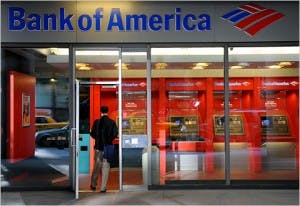Warren Buffett was on CNBC a few weeks ago, and took an emailed question from a viewer. When, the viewer asked, will Bank of America Corp (NYSE:BAC) and Citigroup Inc (NYSE:C) trade above tangible book value like Wells Fargo & Co (NYSE:WFC) and JPMorgan Chase & Co. (NYSE:JPM)?
Here’s Buffett’s response:
Well, a bank that earns 1.3% or 1.4% on assets is going to end up selling above tangible book value. If it’s earning 0.6% or 0.5% on asset it’s not going to sell. Book value is not key to valuing banks. Earnings are key to valuing banks. Now, it translates to book value to some extent because you’re required to hold a certain amount of tangible equity compared to the assets you have. But you’ve got banks like Wells Fargo and USB that earn very high returns on assets, and they at a good price to tangible book. You’ve got other banks … that are earning lower returns on tangible assets, and they’re going to sell — they’re going to sell [for less].
Here’s what he’s talking about:
| Bank | Return on Assets (Avg. Since 2002) | Price to Tangible Book Value |
|---|---|---|
| U.S. Bancorp | 1.69% | 2.61x |
| Wells Fargo | 1.37% | 1.62x |
| PNC | 1.37% | 1.33x |
| Bank of America | 0.82% | 0.9x |
| JPMorgan Chase | 0.70% | 1.27x |
| Citigroup | 0.60% | 0.84x |
Source: S&P Capital IQ.
In other words, a bank isn’t a bank isn’t a bank.

For reasons that escape me, we tend to lump banks into a group (especially big banks), treating them as a monolith. You hear things like, “I like the big banks,” often with little distinguishing between which one. Yet all of the big banks have different business models, different focuses, different customer loyalty, different cross-selling abilities, and so on. The results are vastly different earning potential, and vastly different valuations. “All banks aren’t alike by a long shot, and in our view, Wells Fargo, among the large banks, has some advantages the others do not,” Buffett said during a 2009 Berkshire Hathaway Inc. (NYSE:BRK.A) meeting.
During another interview, he went on about Wells Fargo & Co (NYSE:WFC):
They get their money cheaper than anybody else. We’re the low-cost producer at Geico in auto insurance among big companies. And when you’re the low-cost producer — whether it’s copper, or in banking — it’s huge … The key to the future of Wells is continuing to get the money in at very low costs, selling all kinds of services to their customer and having spreads like nobody else has.
This isn’t a ground-moving insight — Buffett’s key to valuing banks is earnings. You don’t say! — but it’s an important point to remember when forming expectations. There is no rational reason to expect a bank like Bank of America Corp (NYSE:BAC) to trade at a similar price-to-book value as Wells Fargo & Co (NYSE:WFC).
There also might not be much reason to expect valuations to return to levels that prevailed in the past. Here’s Buffett a year ago:
Banks are not going to earn as good a return on equity in the future as they did five years ago. Their leverage is being restrained for good reason in many cases. So, banks earn on assets but the ratio of assets to equity, the leverage they have determines what they earn on equity.
Are banks like Bank of America Corp (NYSE:BAC) and Citigroup Inc (NYSE:C) cheap? Perhaps, although it’s not quite clear just by looking at book value.
The article Buffett’s Key to Valuing Banks originally appeared on Fool.com is written by Morgan Housel.
Morgan Housel owns shares of Berkshire Hathaway. The Motley Fool recommends Berkshire Hathaway and Wells Fargo. The Motley Fool owns shares of Bank of America, Berkshire Hathaway, Citigroup, JPMorgan Chase, PNC Financial Services, and Wells Fargo.
Copyright © 1995 – 2013 The Motley Fool, LLC. All rights reserved. The Motley Fool has a disclosure policy.
